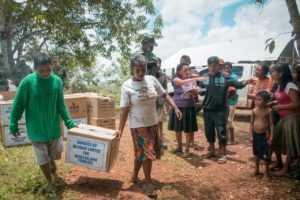
Although Government has managed to put certain mechanisms in place to prepare for Venezuelans seeking refuge in Guyana, one of the most major challenges faced right now by Government is being able to monitor the influx of those persons due to the length of the border between the two countries.
This is according to Vice President and Foreign Affairs Minister Carl Greenidge who told the media that the challenges lie in that fact that it is difficult to locate these refugees and establish their status. This is important so that they can get the necessary healthcare and treatment if necessary.
He disclosed that local authorities have been working collaboratively with the various regional health agencies, and neighbouring Brazil to help locate persons for health screenings.
“If you get 12 people or 15 moving and they are ill; malaria, measles and these types of afflictions, then there is a danger posed, especially to our Indigenous people by personal pandemics,” he noted.
The Minister said if not properly managed, this could lead to something much larger. As such, he said there is a need for special help to monitor and to ensure that the refugees are vaccinated and immunised.
In addition to working with Brazil, Greenidge said Guyana has also been working with international agencies to help locate persons for health screenings.
“We would like to be able to work with all of our neighbours to ensure that health aspect is covered, because to me that poses a bigger threat immediately, than anything else,” Greenidge stated.
When asked to provide more detailed information, he could not provide statistics on the persons crossing the border into Guyana, but warned that the numbers from international agencies may be slightly higher.
At the Mabaruma Regional Hospital, between January and July, some 499 Venezuelans were screened. According to the statistics obtained by this publication, this included 27 skin infections; 45 with respiratory diseases; 234 with malaria; two with tuberculosis; and one HIV case.
There are growing health concerns throughout South America about the movement of people fleeing Venezuela. Last week, Brazil said Venezuela was doing nothing to stop the spread of an outbreak of measles in their country. This was sparked by a migration of Venezuelans fleeing economic collapse.
According to international media reports, since February, four people, three of them Venezuelans, have died of measles in the remote Brazilian border state of Roraima where health authorities have confirmed 281 cases of the disease, mostly among children. The outbreak has also prompted the Brazilian Government to launch a nationwide campaign to vaccinate 11 million children, plus adults who request it. Although many Brazilian children are already vaccinated against the disease, the vaccination rate has dropped since Brazil was declared free of measles in 2016.
Only recently, Guyana Human Rights Association (GHRA) Head Mike McCormack said while the numbers here might not be as many as those in other countries, they will continue to come.
“It is possible that the numbers will increase here, particularly now that this crisis is getting worst,” he told Guyana Times International, explaining that the Government must do everything to prepare for such an event.
McCormack noted that countries in the Andean region seem to be reaching their capacity and they have also made life a bit more difficult than it was before for Venezuelans, by placing visa restrictions, among other things. This, he said, could lend to more Venezuelans coming to Guyana.
“We will see more people coming. My sense is, we won’t see this massive number marching down roads. But I think we need to make a modest effort to try to get early warnings,” he said.
While Colombia has received far more Venezuelans than other countries so far, the United Nations High Commissioner for Refugees (UNHCR) said they are spreading out to other countries.
At least 40,000 Venezuelan migrants arrived in Peru in the first two months of this year. Thousands more have emigrated to Panama, Ecuador, Chile, Spain, the United States and beyond.
It has been reported also that boats carrying Venezuelan migrants have landed on some islands in the Caribbean. In January, one capsized off Curaçao, killing at least four people.
The number of Venezuelans seeking asylum abroad has rocketed by 2000 per cent since 2014. Brazil is another of the countries to have received a huge influx. There is about 600 Venezuelans in Region One (Barima-Waini).



